职业高中英语基础模块下册unit 6 What's important
中职英语-基础模块-下-unit 6 reading说课材料
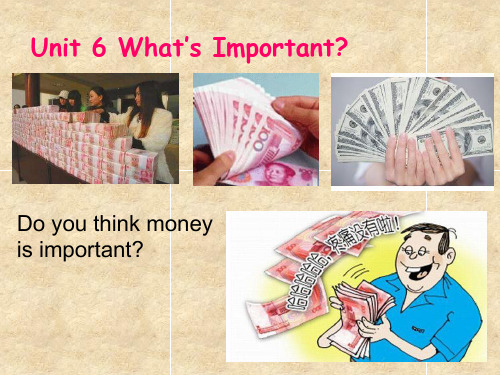
crazy turn green common struggle ma’am terrible memory fail key guard cheer up shy nervous Well done! You are great!
adj.疯狂的;着迷的 嫉妒
adj.普遍的,常见的 v.& n.搏斗,争斗;奋斗,努力 n.女士,夫人 adj.极不好的;可怕的;糟糕的 n.记忆力,记性 v.衰退,衰弱 n.钥匙;关键;答案 n.警卫 振作起来!加油!
a. having money to buy or pay for sth. b. the thing, person, situation that people pay
special attention to c. a long hard fight to get something d. telling the true e. a statement in which someone complains
remind的用法: remind sb. of sth. ; remind sb. that …使某人想起…… remind sb to do sth. … 提醒某人做某事。
它让我想到了我最好的朋友。
It reminds me of my best friend.
请提醒我完成工作。
Please remind me to finish my work.
n.社会,社团
be different from
与……不同
focus
n.焦点;集中点;注意的中心
fashionable adj.流行的,时髦的
distinction
n.区分,区别
at the same time
基础模块下册 Unit 6 Is money so Important
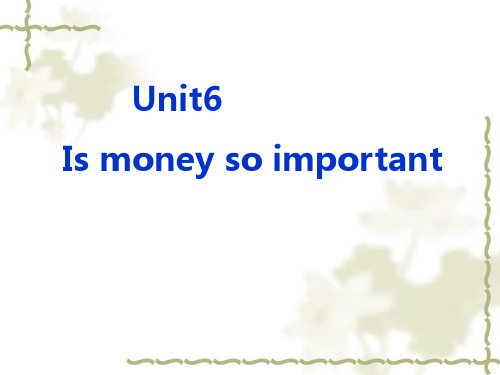
1.remind的用法: remind sb. of sth. ; remind sb. that …使某人想起…… remind sb to do sth. …表示提醒某人做某事。
例句:它让我想到了我最好的朋友。 It reminds me of my best friend.
请提醒我完成工作。
Please remind me to finish my work.
2.Show off 炫耀;卖弄 例:他老爱炫耀卖弄 He is always showing off. 例句:那些男孩们老向别人卖弄他们的运动技巧。 Those boys always show off their sports skills to others. 3.Earn one’s/a living 谋生=make a living 因双亲早亡, 他十几岁的时候就不得不独自谋生。
我们买得起一辆小汽车。 We can afford a car. We cannot afford to pay high rent. 我们付不起高额的租金
6. Once conj.一旦----- (n. 一次 adv. 曾经)
Once you get into a bad habit, you'll find it hard to get out of it. 一旦染上坏习惯,想改掉就难了。
在一个国家里,不是所有人都能同时富起来。 有些人致富早,富起来也容易。有些人致富早,富起 来也容易。有些人尽管不是很富裕,生活也还好。 而另外有些人不得不努力工作才能糊口。
Life is difficult. This is one of the greatest truths. Once we accept that not everybody can afford Nike, we’ll find life is easier. I grew up in Canada, which is known as a rich and developed country.But it doesn’t mean that every family is wealthy.
中职英语-基础模块-下-unit 6 reading
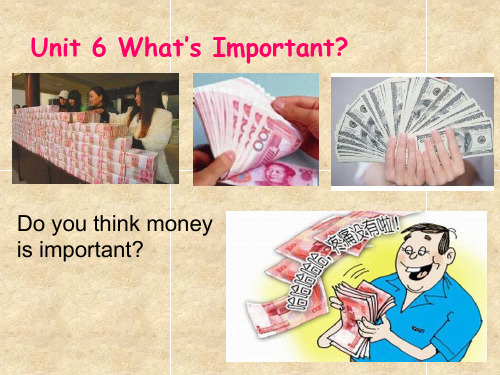
2) Why do young people like to wear famous brand shoes and clothes?
They liked to show off and to become the focus of attention.
3) Can everybody in a country get rich at the same time?
Instead, we were proud of her because she was hard working and honest.
be proud of + 某人/某事 “ 以某人某事为骄傲” 他为自己的女儿感到骄傲。 He is proud of his daughter.
汤姆为他的新车而感到骄傲。 Tom is very proud of his new car.
v.接受;受理
afford
v.负担得起;买得起
grow up
成长;生长成熟
Canada wealthy blame proud
be proud of honest above on earth valuable realize complaint ride
go for a ride outside
n.社会,社团
be different from
与……不同
focus
n.焦点;集中点;注意的中心
fashionable adj.流行的,时髦的
distinction
n.区分,区别
at the same time
同时;一起
well-off
adj.境况良好的;供应充足的
though
conj.虽然,尽管
【语文版】中职英语基础模块下册:Unit 6《What’s Important》课件(2)

4.Some get rich earlier and easily. Some ,though not so rich, are ___________.And some others have to well-off to earn their living work hard___________. 5.Life is difficult ,this is one of the greatest truths. afford once we accept that not everybody can______Nike, we’ll find life is easier. grew up 6.I _________in Canada, which is known as a rich and developed country. 7.Instead ,we were proud of her because she was hard-working ___________and honest.
Unit6
Is money so important?
Fast reading Read the text quickly, and
match the key words with each paragraph.(连线)
Para 1
a.Life is difficult. b. Some people followed the fashion without making any distinction. c. Italy's young people liked to show off
Nothing can be more valuable than our parents' love.
职业高中英语基础模块下册unit-6-What's-important教学内容
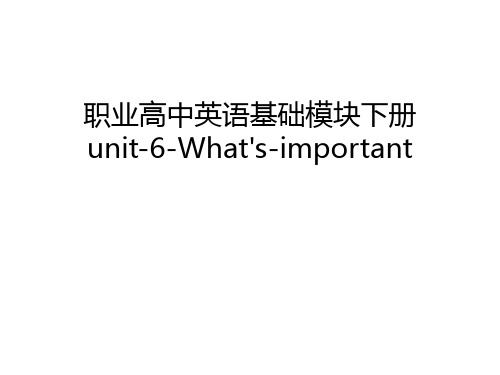
5. Whose 即可指人,也可指物,在定语 从句中作定语,相当于of whom∕ of which.
eg. The young man whose mother works in a middle school is a worker. 母亲在中学工 作的那个年轻人是个工人,
The woman (whom) you saw in my room yesterday is my mother. 你昨天在我房间见 到的那个妇女是我的母亲。
Do you know the young woman (whom) we met at the gate?你认识 我们在大门口遇 见的那个青年妇女吗?
I’ve read the newspaper that (which) carries the editorial.我已 经看过登载那篇社论的那份报纸。(作主语,指物)
The letter that (which) I received yesterday is from my family.我 昨天收到的那封信是我家里来的。(作宾语,指物,可省去)
2. 作宾语
eg. The man whom you want to see has come. 你要见的那个人已经来了。
This is the hospital that we visited yesterday. 这是我们昨天参观的医院。
The letter which I received yesterday was from a friend of mine.我昨天收到的那封信是 我的一个朋友寄来的。
中职英语基础模块下册unit6相关作文
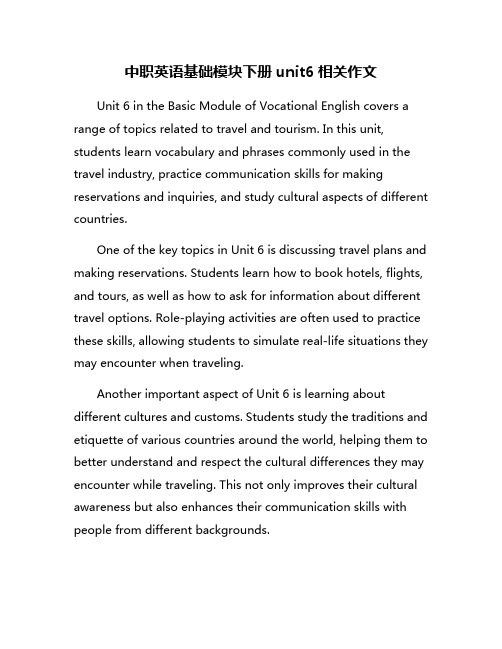
中职英语基础模块下册unit6相关作文Unit 6 in the Basic Module of Vocational English covers a range of topics related to travel and tourism. In this unit, students learn vocabulary and phrases commonly used in the travel industry, practice communication skills for making reservations and inquiries, and study cultural aspects of different countries.One of the key topics in Unit 6 is discussing travel plans and making reservations. Students learn how to book hotels, flights, and tours, as well as how to ask for information about different travel options. Role-playing activities are often used to practice these skills, allowing students to simulate real-life situations they may encounter when traveling.Another important aspect of Unit 6 is learning about different cultures and customs. Students study the traditions and etiquette of various countries around the world, helping them to better understand and respect the cultural differences they may encounter while traveling. This not only improves their cultural awareness but also enhances their communication skills with people from different backgrounds.Furthermore, Unit 6 introduces students to the basics of tourism management, including marketing strategies, customer service, and sustainable tourism practices. By understanding these concepts, students are better prepared for future careers in the travel industry and can contribute positively to the growth and development of the tourism sector.In conclusion, Unit 6 of the Basic Module in Vocational English provides students with essential language skills and cultural knowledge for a successful career in travel and tourism. Through a combination of language practice, cultural studies, and tourism management concepts, students can develop a well-rounded understanding of the industry and build a solid foundation for future success.。
中职教材英语基础模块下册Unit6ppt课件
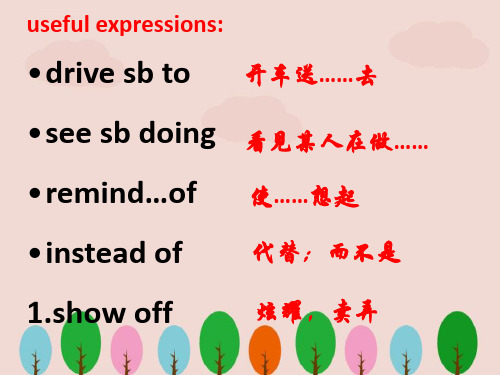
5) We have no coffee. Would you like
a cup of tea instead
6) We cannot afford such a large
apartment.
7) All the farmers have to work hard to
earn
their living.
6. be different from 与……不同
7. not all 并非所有的……
8. at the same time
9. earn one’s living
同时
10. one of….(名词复数)谋生
……之一
本标准适用于已投入商业运行的火力 发电厂 纯凝式 汽轮发 电机组 和供热 汽轮发 电机组 的技术 经济指 标的统 计和评 价。燃 机机组 、余热 锅炉以 及联合 循环机 组可参 照本标 准执行 ,并增 补指标 。
这使我想起意大利, 当它还 是一个发展中国家的时候。
本标准适用于已投入商业运行的火力 发电厂 纯凝式 汽轮发 电机组 和供热 汽轮发 电机组 的技术 经济指 标的统 计和评 价。燃 机机组 、余热 锅炉以 及联合 循环机 组可参 照本标 准执行 ,并增 补指标 。
This reminds me of Italy when it was still a developing country. Young people there didn’t just want to wear jeans; they wanted to wear Levi’s. And sports shoes were not shoes unless they were Nike or Reebok.
职高基础模块(下)Unit 6 Reading2
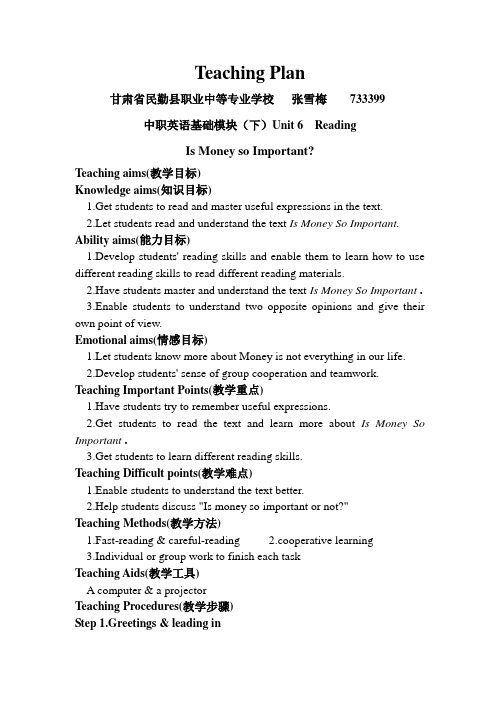
Teaching Plan甘肃省民勤县职业中等专业学校张雪梅733399中职英语基础模块(下)Unit 6 ReadingIs Money so Important?Teaching aims(教学目标)Knowledge aims(知识目标)1.Get students to read and master useful expressions in the text.2.Let students read and understand the text Is Money So Important. Ability aims(能力目标)1.Develop students' reading skills and enable them to learn how to use different reading skills to read different reading materials.2.Have students master and understand the text Is Money So Important.3.Enable students to understand two opposite opinions and give their own point of view.Emotional aims(情感目标)1.Let students know more about Money is not everything in our life.2.Develop students' sense of group cooperation and teamwork. Teaching Important Points(教学重点)1.Have students try to remember useful expressions.2.Get students to read the text and learn more about Is Money So Important.3.Get students to learn different reading skills.Teaching Difficult points(教学难点)1.Enable students to understand the text better.2.Help students discuss "Is money so important or not?"Teaching Methods(教学方法)1.Fast-reading & careful-reading2.cooperative learning3.Individual or group work to finish each taskTeaching Aids(教学工具)A computer & a projectorTeaching Procedures(教学步骤)Step 1.Greetings & leading inSay something about "happiness" and lead in the topic of the reading part.What’s the happiness to you?Different students have different answers: good job, friendship, big house, love, health, money, success,etc.(设计意图:以问题导入,引起学生的兴趣。
- 1、下载文档前请自行甄别文档内容的完整性,平台不提供额外的编辑、内容补充、找答案等附加服务。
- 2、"仅部分预览"的文档,不可在线预览部分如存在完整性等问题,可反馈申请退款(可完整预览的文档不适用该条件!)。
- 3、如文档侵犯您的权益,请联系客服反馈,我们会尽快为您处理(人工客服工作时间:9:00-18:30)。
4. 先行词中既有人又有物时: eg. We were deeply impressed by the teachers and schools that we had visited. 我们访问过的老师和学校给我们 留下深刻的印象。
1. whom, which在从句中作介词宾语时,可以和介 词一起引导定语从句,也可以把介词放在从句中有 关动词的后面. eg. The young man to whom you talked is a famous athlete. The young man whom you talked to is a famous athlete.刚才你与之谈话的年轻人是个著名 的运动员。 This is the house in which Lu Xun once lived. 这就是鲁迅曾经住过的房子。
5. Whose 即可指人,也可指物,在定语 从句中作定语,相当于of whom∕ of which. eg. The young man whose mother works in a middle school is a worker. 母亲在中学工 作的那个年轻人是个工人, This is Mr. Snow whose wife works at a department store. 这位是斯诺先生,他的妻 子在一家百货店工作。 What’s the name of the boy whose brother is a doctor? 他哥哥是医生的那个孩子叫什 么名字?
※keep on doing sth 持续不断、坚持做某事 ※put … into practice 把……付诸实践
3.Whose还可以在从句中与它所修饰的词一起做介 词宾语
• eg. The boss in whose company my father worked is a foreigner.我父亲工作过的那 个公司的老板是个外国人。
※只用that 而不用 which的情况
1. 先行词为all, everything, something, anything, nothing, none, one, much, little, few等不定代词 时或先行词是受到这些不定代词以及the only, the very, the same, the last 等词修饰时。 eg. That’s all that I know. 我知道的就这些。 We know nothing that happened here yesterday. 我们不知道昨天这里发生的事。 The only thing that you have to do is to help clean the windows.唯一的一件你得做的事是帮助把窗 户搽干净。 I mean the one that was bought yesterday.我指的 是昨天买的那个。
1. Who 指人,在定语从句中作主语。 eg. The man who was here yesterday is a middle school teacher.昨天来这里的那个人 是个中学老师。 Girls who work in restaurants are called waitresses.在餐馆里工作的女孩被称为女 服务员。
2. 先行词被形容词最高级修饰时 Eg. This is one of the most exciting football games (that) I have never seen.这是我所看过的 足球赛中最激动人的一种。 It was the finest art exhibition (that) we ever saw.这是我们所见过的最好的艺术展览。 This is the best thing that has been used against pollution.这是目前用于防污染的最好的东西。 It is the most important task that should be finished soon. 这是必须马上完成的最重要的任 务。
4.that 多指物,也可指人。指物时与which 通用, 指人时与who, whom 通用。在定语从句中可作主语 和宾语,作宾语时可省略。
eg. Is he the man that (who) will teacher us English?他就是要 来教我们英语的那个人吗?(作主语,指人) Who is the person that (who) is working at the computer over there? 在计算机上工作的那个人是谁?(作主语,指人) I’ve read the newspaper that (which) carries the editorial.我已 经看过登载那篇社论的那份报纸。(作主语,指物) The letter that (which) I received yesterday is from my family.我 昨天收到的那封信是我家里来的。(作宾语,指物,可省去) This is the house that (which) they built last year. 这就是他们 去年修的房子。(作宾语,指物,可省去)
3. 先行词为数词或被序数词修饰时: eg. I’ll never forget the first lesson (that) I learned at this school.我永远不 会忘记在这所学校里上的第一堂课。 The first thing (that) we should do is to work out a plan. 我们应该做的第一件事是 订个计划。 Look at these flowers, you can see the two that you gave me.瞧这些花, 你能看到 你给我的那两朵。
3. 作定语 关系代词whose在定语从 句中作定语用。 eg. What’s the name of the young man whose sister is a doctor? 他姐姐是医生 的那个年轻人叫什么名字? Is that the man whose house was burnt down last week. 是不是这个人的 房子上星期着火啦?
Unit3
定语从句(一) Attributive Clause
在复合句中修饰某一名词或代词的从句叫定语从句, 在句中作定语。 被定语从句所修饰的词叫先行词,定语从句一般放在 先行词之后。 引导定语从句的有关系代词(that, which, who, whom, whose) 和关系副词(where, when, why). 本单元我们将 学习由关系代词引导的定语从句。 eg. The man who lives next to us sells vegetables. 住在我 们隔壁的人是买菜的。 You must do everything that I do. 我做什么, 你就必 须做什么。 The man who is standing by the gate is our doorman. 站在大门旁边的那个人是我们的看门人。
2. 作宾语
eg. The man whom you want to see has come. 你要见的那个人已经来了。 This is the hospital that we visited yesterday. 这是我们昨天参观的医院。
The letter which I received yesterday was from a friend of mine.我昨天收到的那封信是 我的一个朋友寄来的关系代词可以省略。如上面三例中的关系 代词均可省略。
2. Whom 指人,在定语从句中作宾语, 可省略。 eg. The man (whom) I telephoned is out. 我 给他打电话的那个人出去了。 The woman (whom) you saw in my room yesterday is my mother. 你昨天在我房间见 到的那个妇女是我的母亲。 Do you know the young woman (whom) we met at the gate?你认识 我们在大门口遇 见的那个青年妇女吗?
关系代词用来引导定语从句,在先行词和定语从 句中起纽带作用,使二者联系起来。 关系代词同时又用作定语从句的一个句子成分, 可做主语,宾语和定语。 1. 做主语 做主语时,其谓语动词的人称和数须和 先行词一致。 eg. The children who live on the nearby farms go to school by bike.住在农场附近的孩子都是骑车去 上学。 The man who is standing by the gate is our doorman. 站在大门旁边的那个人是我们的看门 人。
2. 关系代词that作介词宾语时,介词不可放 在 that之前,只能放在从句中原来的位置上。 eg. The city that she lives in is very far away.她 生活的那座城市离这里很远。
Can you lend me the book that you were talking about the other day?你可以把你那天谈的那本 书借给我吗?
3.Which 指物,在定语从句中可作主语或 宾语,作宾语时可省略。 eg. The book which is on the desk is mine .桌 子上的书是我的。 The dictionary is a book which gives the meaning of words.词典是解释词的意义的书。 Here is the book (which) the teacher mentioned yesterday. 这就是老师昨天提到的那本书。 The film (which) I saw yesterday is very interesting.我昨天看的电影很有趣。
